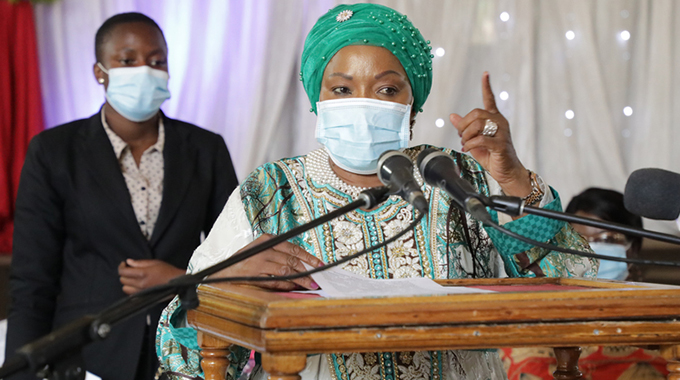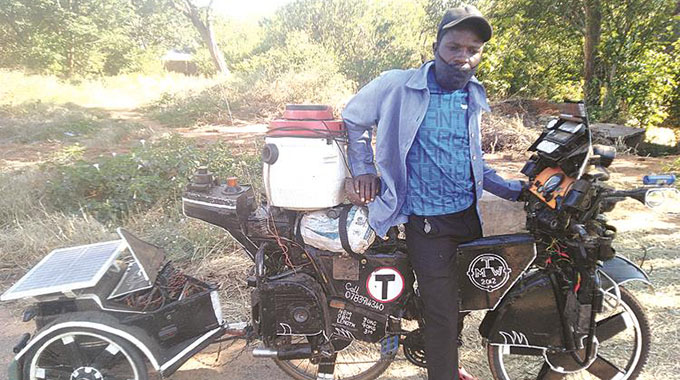First Lady in programme to strengthen families

Tendai Rupapa and Ivan Zhakata
ZIMBABWE is on course to strengthening family bonds, unity and morality thanks to the Nharirire yeMusha programme launched by First Lady Auxillia Mnangagwa yesterday as she endeavours to resolve challenges in the home that have driven children into drug abuse and promiscuity, among many other vices.
“Nharirire” is a Shona word loosely translated to mean someone who watches over his/her valuables.
The programme, which focuses on parents, comes hard on the heels of the Gota/Nhanga/Ixiba programme in which the First Lady, Chiefs and their spouses and the elderly taught youths what was expected of them and sought solutions to issues affecting them.
So lively was yesterday’s launch that it left participants crying out for more sessions. This is the first time since independence that a First Lady has led from the front and committed time to addressing issues affecting families.

Professor Francis Matambirofa gives a presentation to men during Nharirire yemusha naAmai in Harare yesterday. —Picture: John Manzongo
As women were going through an interactive session with the First Lady and experts in various fields at Harare Girls High School, men were also exchanging notes and learning various issues under the guidance of professional speakers at the City Sports Centre.
“This programme (Nharirire yemusha naAmai) is about the life we are leading daily as parents and as families. This is a new programme that we have never sat down for as mothers. The Gota/Nhanga/ixiba programme I was moving around with has led us to be here as mothers while fathers have their own gathering. There are issues that cropped up from this programme in all the 10 provinces. The programme we have today is not about listening to me alone, i seek that we put our heads together and build our images as mothers. This will make it possible for us to have time with our children whom we have neglected over a long period of time. What is a mother, what are you doing in your family, community and nation as a whole?” she said.
Mothers, the First Lady said, needed to be alert and proactive to ensure children do not fall into alcohol and drug abuse.
“Women must understand that children are being affected by drugs. Nharirire yemusha should be on the look-out and know this and not awaken when the child is already wasted by drugs. This is what you are supposed to do as wardens to know ahead. As a mother these things that are taking place under our watch are unacceptable. As a mother you perform the role of an aunt, grandmother and elder sister. Your role as women is too big,” she said.

One of the men contributes ideas during Nharirire yemusha naAmai in Harare yesterday. — Picture: John Manzongo
The First Lady drew laughter from the audience when she said baboons had lessons to offer when it comes to taking care of families.
“I think we know what baboons do? It sits atop looking at all directions to assess whether there are no predators. Something that may ambush or harm them. When it sees danger, it gives a signal to warn others. It makes a sound to warn its troops that danger is lurking. Once it does that it takes its position and decision on whether or not to run away and when danger comes it affects no one. We can also call this nharirire, kuchengetedza mhuri,” she said.
It was an intriguing moment of reflection when she asked women from the floor what their views were.
“What are your thoughts as women, our roles as women?” she probed.
One woman rose and said: “The way people built a watchtower from where someone would check if the field was safe. This gives an image of a woman sitting on a watchtower to check if the home or her family is safe from ‘predators’.”
Another woman quipped: “I see a mother as someone who looks at all four sides to check what is approaching from there. As a watchover person, you will be analysing things that take place in the home.” The First Lady concurred with the women saying said it was the role of mothers to look after families.
“SaAmai mirai panzvimbo, tisu vabatanidzi vemhuri, vayananisi, vavaki uye vatonhodzi. Ngativeyi nharirire yemisha tive vatariri vanochengetedza nzvimbo dzatigere,” she said.

Women follow proceedings during Nharirire yemusha naAmai in Harare yesterday. — Picture: Memory Mangombe
One of the speakers, Mrs Birgitta Matengenzara, a teacher at Girls High School, said there was need for peace in the home and spelt out the need to avoid quarrelling.
“There are women who scold a man’s whole family and ancestry when angered in front of the children. What do the children learn? Don’t you think it will affect them and even their studies at school? When their daughter is married she will think the culture of domestic violence she witnessed between her parents is normal and this will destroy her marriage” she said.
“Let us learn to speak well in our homes. The First Lady said we are builders and calmers of explosive situations. If there is conflict in the home, you should resolve it as a mother. We must know what to say and where. Mothers must cultivate a relationship with their daughters so that they are free to ask about life. Even menstrual health issues some children are afraid of asking their mothers. Let’s speak positively to our children and be approachable even by the community,” she said.
Mrs Naume Chimanikire, the wife to Chief Seke spoke about managing stress in the home.
“Violence in the homes is increasing. Mothers and daughters in law are in conflict. The mother in law is stressing a child who was born and raised by another woman. Some women are having extra-marital affairs and this affects children. We want this programme in the communities and districts we live in because the issue yekushungurudzana mudzimba is the order of the day in our communities,” she said.
Ms Eveline Maisvoreva a family therapist dwelt on the role of the woman in the home. She touched on issues of cooking, doing laundry for the husband and family and teaching children manners.
Mrs Rayirayi Gwemende’s topic was on who owns children in the home.
“These are our children as parents. Parenting is not relegated. Once you relegate, then parenting is gone. If your child is on the wrong, correct that child, if you do not, no one will. In counselling children, let’s do it with love, let’s not frustrate or abuse our children because this will lead children to bad thinks like drug abuse. Make time for your children because if you don’t television and phones will do that for them and they will adopt western cultures which will have consequences,” she said.
Bishop Dr Patience Hove of El Shadai Ministries International said; “This Nharirire meeting was very good because it focuses on the woman that she is the watch person who watches over the family and she must take care of her children. We are not spending enough time with our children and are leaving them with maids and gardeners. Today we have been taught by the First Lady to be able to listen to our children from kindergarten so that even when they are growing up we notice their problems, who they are, we notice what is wrong with them before they are too old so that all these habits that come on later we would have noticed them,” she said.
The women pleaded with the First Lady to have another session in Harare before she takes the programme to other provinces, saying they still have a lot to learn and share.
Holding an interactive session with the men was Professor Mickias Musiyiwa from the University of Zimbabwe’s Department of History, Heritage and Knowledge Systems, Professor Francis Matambirofa from the Department of Languages, Literature and Culture at the University of Zimbabwe and Mr Samuel Gumisiro Dhliwayo a senior cultural officer.

One of the women contributes ideas during Nharirire yemusha naAmai in Harare yesterday. — Picture: Memory Mangombe
Prof Musiyiwa said during the First Lady’s gota/nhanga/ixiba programme they established that most challenges faced by children are coming from their families.
He said communication was key in families and inculcating cultural values to children.
“Communication between husband and wife is key. If a house has no communication, there will be squabbles and things will not go well. There should be trust and we as fathers, as heads of houses, have a huge task to play in the family. We must make sure that the family is well taken care of and provided for. A head of the house should know how to speak to his wife and children,” he said.
Mr Abshir Mutarisi who attended the programme, said it was the duty of parents to teach their children to refrain from taking drugs and embrace our traditional values.
“I would like to thank the First Lady for coming up with this program. It has given light on how we can restore our traditional values to our children. We as parents should teach our children the right path,” he said.
A Mbare resident, Christopher Chihota welcomed the Nharirire yemusha program saying it will go a long way in restoring traditional cultural values in children.
Archbishop Ernest Makumbe from Chitendero Chemapositori Apostolic Church expressed concern over the country’s laws on corporal punishment saying it disempowers parents from disciplining and reprimanding wayward behavior in children.
Nharirire yemusha naAmai will be taken to all the provinces.








Comments